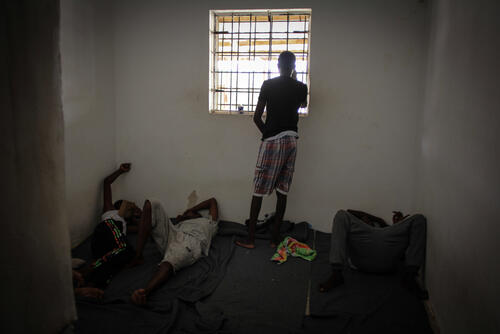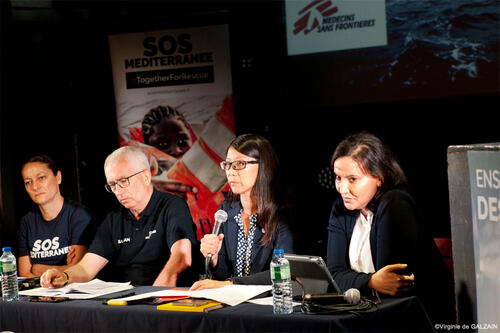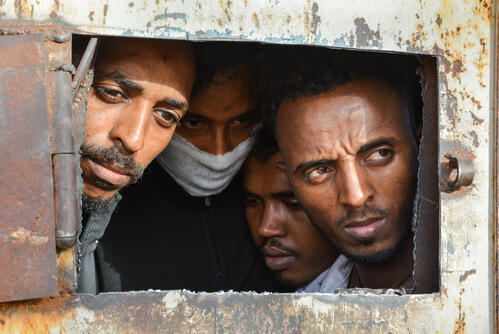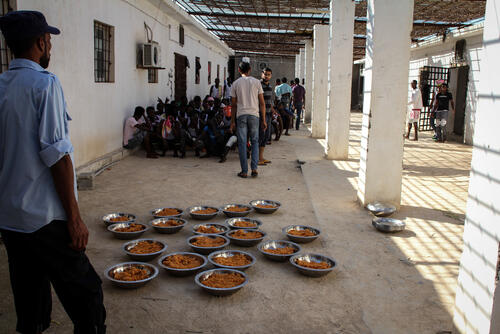- Over recent weeks, a number of refugees have been rescued in the Central Mediterranean; over 200 have drowned in 2019
- People rescued have been brought back to Libya, in violation of international law, and locked in crowded detention centres
- Conditions in the centres are dire, with a lack of food and water, and no protection against the cold
Over the past two weeks, Médecins Sans Frontières (MSF) teams in Libya have observed a sharp increase in the number of people held in detention centres in Misrata and Khoms in Libya, following a series of disembarkations of people to Libyan shores. Vulnerable refugees, migrants, and asylum seekers were intercepted or rescued at sea and brought back to Libya in violation of international law. The population in the detention centres in the area went from 650 at the beginning of the year to 930 today.
Two days ago, 106 people disembarked in Khoms from a commercial ship. It is feared that at least six people reportedly drowned while the group was at sea.
“Upon disembarkation, several people were in need of urgent medical care and we provided medical assistance”, explains Julien Raickman, in charge of MSF activities in Misrata, Khoms and Bani Walid.
200
2
5,000
5,
15,000
15,
Our teams organised 10 medical referrals to a nearby hospital. Despite this response, a 15 year-old boy later died in hospital. Yesterday, another group of 144 people also rescued by a merchant ship disembarked in Misrata.
Among the 250 people who disembarked in Misrata and Khoms, there are women, some of whom are pregnant, babies and young children under seven years old. They were transferred to detention centres in the area. Days earlier, another 117 people drowned in a separate incident, clearly pointing to a deliberate neglect on the part of European authorities for providing lifesaving search and rescue capacity in the Central Mediterranean.
People recently disembarked in Libya are now locked up in overcrowded detention facilities. The facilities have been overwhelmed with the new arrivals and are struggling to cope, leading to a further deterioration of already dire detention conditions. The people detained have virtually no access to open air space and little access to clean water and food. Food is insufficient and totally inadequate to meet the nutritional needs of people with serious medical conditions, children and pregnant women.
People are returned to the country they try to flee, they are desperate. They need to be assisted and protected, not sent back into a cycle of detention.Julien Raickman, Head of Mission in Libya, MSF Paris
Among the people recently disembarked, some are suffering from malnutrition, hypothermia, or severe diarrhoea. Some report that before trying to cross the Mediterranean Sea, they had been held captive by traffickers for weeks, sometimes months, and were deprived of food and systematically abused and tortured.
“People are returned to the country they try to flee, they are desperate,” says Raickman. “They need to be assisted and protected, not sent back into a cycle of detention.”
Detention centres in Tripoli are also seeing an increase in population. Nearly all detention centres are poorly insulated against the winter weather, resulting in increased illnesses associated with prolonged cold weather exposure. In one detention centre in the capital, MSF medical teams have observed signs of unhealthy weight loss among detainees due to an insufficient food supply.
Recent fighting that erupted in southern Tripoli has left 14 dead and 58 wounded according to World Health Organization (WHO) representatives in Libya. Civilians have been caught at times in the conflict zone, including approximately 228 refugees, migrants, and asylum seekers who are being arbitrarily held in the Qasr Bin Gashir detention centre, previously located on the frontlines. Power to the centre’s borehole pump was lost and detainees were left without access to clean water until we were able to respond with an emergency provision of water. Our medical teams have visited the centre twice over the past 48 hours to conduct consultations and provide medication for tuberculosis patients.
Libya is not a safe place to return refugees and migrants: the levels of violence they are exposed to while in the country are well documented.
“It is beyond cynicism that the EU and its Member States continue to implement policies based on intercepting and forcibly returning vulnerable people to detention in Libya, while also continuing to deliberately obstruct lifesaving search and rescue vessels which are desperately needed in the Central Mediterranean,” says Sam Turner, in charge of MSF activities in Tripoli and Mediterranean search and rescue operations.






